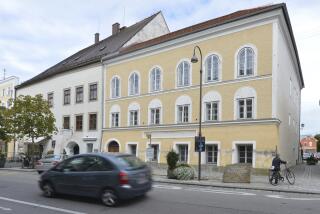East German Crimes to Be Probed : Unification: A special commission is formed after a national debate on dealing with the former Communist state’s history of oppression.
- Share via
BERLIN — In an attempt to come to grips with the latest troubled chapter of their nation’s past, members of the German Parliament on Thursday formed a special commission to study the excesses of the East German Communist state.
The founding of the commission, made up of Parliament members and respected social scientists, follows a prolonged national debate about the best way to deal with the 40-year history of East Germany, which was absorbed into a Western-dominated, reunified nation 17 months ago.
That history has increasingly dominated the present as a seemingly unending series of revelations and scandals tumble forth about the activities of the infamous East German state security network, known as the Stasi. Many of these revelations have linked respected post-revolution eastern political figures to the Stasi, sowing turmoil and mistrust during the formative period of democracy in the east and generating pressure for action to deal with the past.
“As East Germans and West Germans, as one people, it can only be . . . a good thing to face our past,” said Rainer Eppelmann, an eastern German Parliament member named to head the 27-member commission.
Eppelmann, a pacifist clergyman who became defense minister in East Germany’s only freely elected government in 1990, made his comments at the start of a five-hour parliamentary debate in Bonn on the East German past and the Western reaction to it.
He rejected the idea that the commission would launch a witch hunt but pledged that it would deal with more than just Stasi activities.
Heinz Eggert, Saxony’s state interior minister and a victim of Stasi oppression, told Parliament that the commission’s job is to reveal the structure of the East German political system so that the repression it carried out could never be repeated. ‘In order that this confrontation with the past doesn’t degenerate into a farce, culprits must admit to what they did and victims must get a new chance,” he said.
The commission is expected to deliver an interim report before the end of next year.
The special commission made up of members of Parliament and leading experts outside represents a compromise. Some eastern Germans had wanted those accused of excesses during the Communist era to face a Nuremberg-style public tribunal; others, mainly from the west, argued against such a broad investigation because it would be divisive, potentially explosive and counterproductive.
The decision to establish such a high-profile special commission also stems from the apparent inability of German courts to dispense justice in instances in which repression and human rights violations occurred.
So far, courts in Berlin have convicted four former East Berlin border guards in connection with killings at the Berlin Wall. But none of those in the East German hierarchy responsible for the wall itself or the repression that occurred behind it have been forced to answer for their actions.
Erich Mielke, the 84-year-old former Stasi chief, is on trial in Berlin, but not for anything he did during the East German era. He faces murder charges in connection with the death of two policemen during the chaotic final phase of the Weimar Republic 61 years ago.
Meanwhile, Erich Honecker, the former East German leader and the man most directly responsible for building the Berlin Wall, remains under protection of the Chilean ambassador in Moscow.
More to Read
Sign up for Essential California
The most important California stories and recommendations in your inbox every morning.
You may occasionally receive promotional content from the Los Angeles Times.













